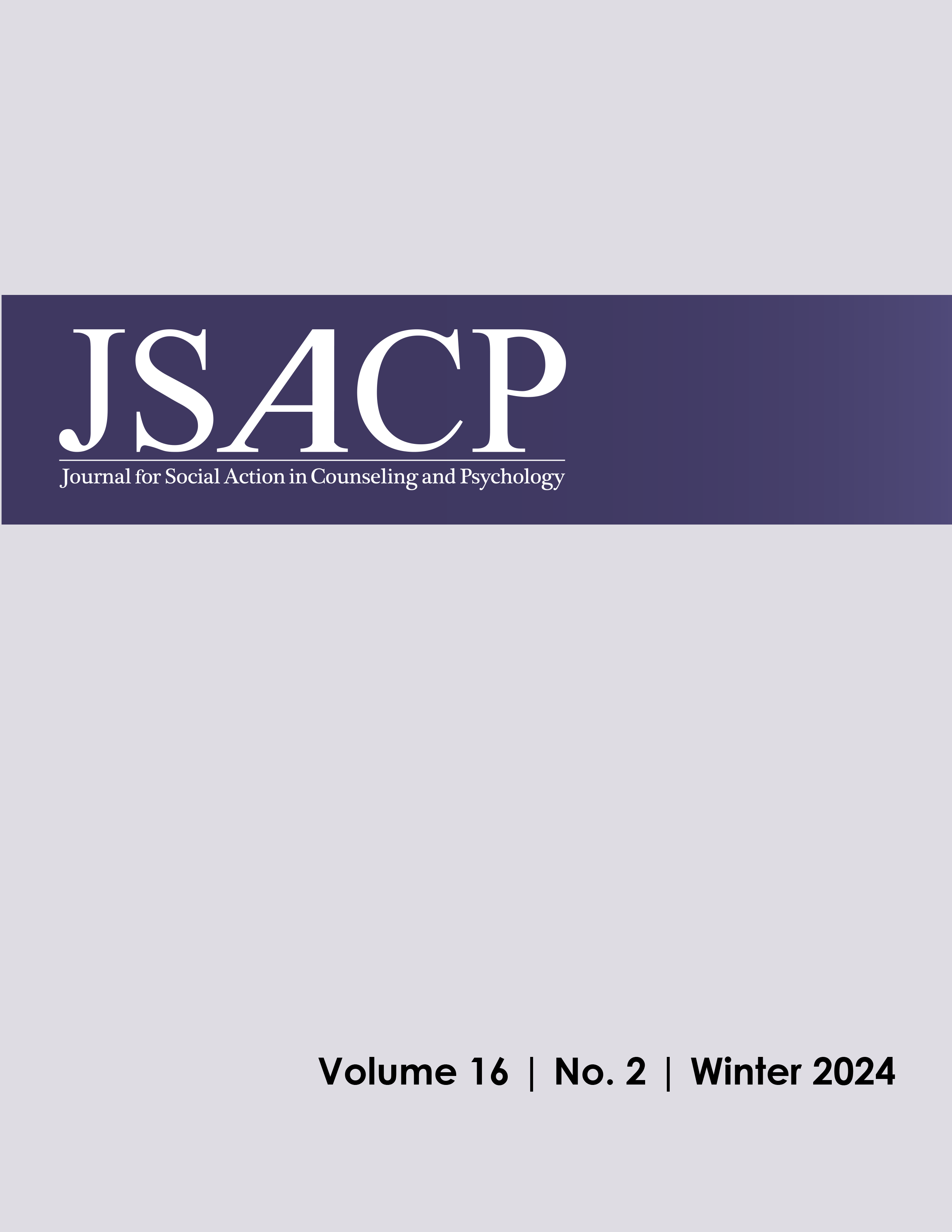Pathways to Allyship in Counselor Education and Counseling Psychology
A Model for White Ally Development
DOI:
https://doi.org/10.33043/8ycba9236cKeywords:
White allyship, BIPOC, Cross-racial relationships, Grounded theoryAbstract
In pursuit of racial justice, there is a need to understand how to engage in anti-racist allyship to reduce potential harm as experienced by the most vulnerable members within academia. In this study, we utilized grounded theory methodology to create a model of allyship based on the definitions and experiences of BIPOC counselor education and counseling psychology faculty members. Participants included 12 faculty members who identified as BIPOC and who could identify traits of White allies through existing relationships and experiences. Participants represented diversity in racial identity and academic rank and were selected through theoretical, purposive, and convenience sampling methods. Through constant comparison of the data, we developed a model identifying contextual processes and components of White allyship. The model demonstrates generative and restrictive pathways for ongoing allyship across the domains of Humility, Engagement, Impact, and Positionality. Implications for counselor educators, counseling psychologists, and researchers are presented.
Downloads
References
Bayne, H., Hays, D., Harness, L*., & Kane, B.* (2021). Whiteness scholarship in the counseling profession: A 35-year content analysis. The Professional Counselor, 11(3), 313 – 326. https://doi.org/10.15241/hbb.11.3.313
Bayne, H., Ocampo, R.*, & Wilson, T.* (2023). Building cultural empathy and deconstructing whiteness in counselor education. Counselor Education and Supervision, 63(2), 118 – 131. https://doi.org/10.1002/ceas.12263
Boutte, G. S., & Jackson, T. O. (2014). Advice to white allies: Insights from faculty of color. Race Ethnicity and Education, 17(5), 623-642. https://doi.org/10.1080/13613324.2012.759926
Bridges, C. E., & Mather, P. (2015). Joining the struggle: White men as social justice allies. Journal of College & Character, 16(3), 155-168. https://doi.org/10.1080/2194587X.2015.1057155
Burns, M. D., & Granz, E. L. (2023). “Sincere White people, work in conjunction with us”: Racial minorities’ perceptions of White ally sincerity and perceptions of ally efforts. Group Processes & Intergroup Relations, 26(2), 453-475. https://doi.org/10.1177/13684302211059699
Charmaz, K. (2014). Constructing grounded theory (2nd ed.). SAGE Publications Ltd.
Corbin, J., & Strauss, A. (2015). Basics of qualitative research: Techniques and procedures for developing grounded theory (4th ed.). SAGE Publications Ltd.
Day-Vines, N. L., Wood, S. M., Grothaus, T., Craigen, L., Holman, A., Dotson-Blake, K. and
Douglass, M. J. (2007). Broaching the subjects of race, ethnicity, and culture during the counseling process. Journal of Counseling & Development, 85(4), 401-409. https://doi.org/10.1002/j.1556-6678.2007.tb00608.x
Edwards, K. E. (2006). Aspiring social justice ally identity development: A conceptual
model. NASPA Journal, 43(4), 39-60. https://doi.org/10.2202/1949-6605.1722
Ford, K. A., & Orlandella, J. (2015). The “not-so-final-remark”: The journey to becoming white allies. Sociology of Race and Ethnicity, 1(2), 287-301. https://doi.org/10.1177/2332649214559286
Hays, D., Bayne, H., Gay, J., McNiece, Z., & Park, C. (2023). A systematic review of whiteness assessment properties and assumptions: Implications for counselor training and research. Counseling Outcome Research and Evaluation, 14(1), 58-76. https://doi.org/10.1080/21501378.2021.1891877
Helms, J. E. (1984). Toward a theoretical explanation of the effects of race on counseling: A Black and White model. The Counseling Psychologist, 12(3-4), 153–165. https://doi.org/10.1177/0011000084124013
Helms, J. E. (2017). The challenges of making whiteness visible: Reactions to four whiteness articles. The Counseling Psychologist, 45(5), 717-726. https://doi.org/10.1177/0011000017718943
Johnson, I. R., & Pietri, E. S. (2022). An ally you say? Endorsing White women as allies to encourage perceptions of allyship and organizational identity-safety among Black women. Group Processes & Intergroup Relations, 25(2), 453-473. https://doi.org/10.1177/1368430220975482
Lincoln, Y. S., & Guba, E. G. (1985). Naturalistic inquiry. SAGE publications.
Margolin, L. (2015). Unpacking the invisible knapsack: The invention of white privilege pedagogy. Cogent Social Sciences, 1(1), 1-9. https://doi.org/10.1080/23311886.2015.1053183
Mathew, A., Risdon, S. N., Ash, A., Cha, J., & Jun, A. (2023). The complexity of working with white racial allies: Challenges for diversity educators of color in higher education. National Association of Diversity Officers in Higher Education, 16(1), 88-96. https://doi.org/10.1037/dhe000310
Nuru, A. K., & Arendt, C. E. (2019). Not so safe a space: Women activists of color’s responses to racial microaggressions by white women allies. Southern Communication Journal, 84(2), 85-98.
Okun, T. (2001). White supremacy culture. dRworks. https://www.whitesupremacyculture.info/uploads/4/3/5/7/43579015/okun_-_white_sup_culture.pdf
Ostrove, J. M., & Brown, K. T. (2018). Are allies who we think they are? A comparative analysis. Journal of Applied Social Psychology, 48(4), 195-204. https://doi.org/10.1111/jasp.12502
Patton, L. D., & Bondi, S. (2015). Nice white men or social justice allies?: Using critical race theory to examine how white male faculty and administrators engage in ally work. Race Ethnicity and Education, 18(4), 488-514. https://doi.org/10.1080/13613324.2014.1000289
Reason, R. D., Millar, E. A., & Scales, T. C. (2005). Toward a model of racial justice ally development. Journal of College Student Development, 46(5), 530 - 546. https://doi.org/10.1353/csd.2005.0054
Selvanathan, H. P., Ulug, O. M., & Burrows, B. (2023). What should allies do? Identifying activist perspectives on the role of white allies in the struggle for racial justice in the United States. European Journal of Social Psychology, 53(1), 43-60. https://doi.org/10.1002/ejsp.2882
Sue, D. W. (2010). Microaggressions, marginality, and oppression: An introduction. In D. W. Sue (Ed.), Microaggressions and marginality: Manifestation, dynamics, and impact (pp. 3–22). John Wiley & Sons, Inc..
Sue, D. W. (2017). The challenges of becoming a white ally. The Counseling Psychologist, 45(5), 706-716. https://doi.org/10.1177/0011000017719323
Spanierman, L. B., & Smith, L. (2017a). Roles and responsibilities of white allies: Implications for research, teaching, and practice. The Counseling Psychologist, 45(5), 606-617. https://doi.org/10.1177/0011000017717712
Spanierman, L. B., & Smith, L. (2017b). Confronting white hegemony: A moral imperative for the helping professions. The Counseling Psychologist, 45(5), 727-736. https://doi.org/10.1177/0011000017719550
Stahl N. A., & King J. R. (2020). Understanding and using trustworthiness in qualitative research. Journal of Developmental Education, 44(1), 26-28. http://www.jstor.org/stable/45381095
Downloads
Published
How to Cite
Issue
Section
License
Copyright (c) 2024 Hannah Bayne, Nia Page, John Harrichand, Anita Neuer Colburn

This work is licensed under a Creative Commons Attribution-NonCommercial-NoDerivatives 4.0 International License.
By submitting to JSACP, the author(s) agree to the terms of the Author Agreement. Beginning in 2018, all authors retain copyrights associated with their article contributions and agree to make such contributions available under a Creative Commons Attribution-NonCommercial-NoDerivatives 4.0 International license upon publication in JSACP. Copyrights to articles published prior to 2018 have been transferred from the authors to JSACP.









